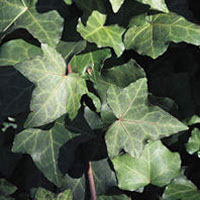Ivy Leaf
 © Martin Wall
© Martin WallParts Used & Where Grown
Ivy is an evergreen climber native to the damp woods of western, central, and southern Europe. The leaf is used medicinally.1 It should be carefully distinguished from poison ivy found in the Americas.
- Reliable and relatively consistent scientific data showing a substantial health benefit.
- Contradictory, insufficient, or preliminary studies suggesting a health benefit or minimal health benefit.
- For an herb, supported by traditional use but minimal or no scientific evidence. For a supplement, little scientific support.
Our proprietary “Star-Rating” system was developed to help you easily understand the amount of scientific support behind each supplement in relation to a specific health condition. While there is no way to predict whether a vitamin, mineral, or herb will successfully treat or prevent associated health conditions, our unique ratings tell you how well these supplements are understood by the medical community, and whether studies have found them to be effective for other people.
For over a decade, our team has combed through thousands of research articles published in reputable journals. To help you make educated decisions, and to better understand controversial or confusing supplements, our medical experts have digested the science into these three easy-to-follow ratings. We hope this provides you with a helpful resource to make informed decisions towards your health and well-being.
This supplement has been used in connection with the following health conditions:
| Used for | Amount | Why |
|---|---|---|
Asthma | 25 drops of a leaf extract twice per day | A study involving children with bronchial asthma suggested that ivy leaf was effective in increasing the amount of oxygen in the lungs. |
Bronchitis | Adults: 50 drops extract twice per day; children: 25 drops twice per day | Ivy leaf is anti-inflammatory and has been shown to be as effective as the drug ambroxol for chronic bronchitis. |
Chronic Obstructive Pulmonary Disease | 50 drops of a concentrated alcohol extract twice per day | One double-blind trial found an ivy leaf extract to be as effective as the mucus-dissolving drug ambroxol for treating chronic bronchitis, which is a component of chronic obstructive pulmonary disease.
|
Cough | Refer to label instructions | Ivy leaf has a long history of use for relieving coughs. |
Traditional Use (May Not Be Supported by Scientific Studies)
Ivy leaves were held in high regard by the ancients. They formed not only the poet’s crown but also the wreath of the Greek god of wine, Dionysus. The ancient Greeks believed that binding the forehead with ivy leaves would prevent the effects of inebriation.2 Greek priests presented a wreath of ivy to newlyweds, and ivy has been traditionally regarded as a symbol of fidelity. Romans regarded ivy as excellent feed for their cattle.3 Traditional herbalists have used ivy for a wide number of complaints, including bronchitis, whooping cough, arthritis, rheumatism, and dysentery. Decoctions of the herb were applied externally against lice, scabies, and sunburn.4
Copyright © 2024 TraceGains, Inc. All rights reserved.
Learn more about TraceGains, the company.
The information presented by TraceGains is for informational purposes only. It is based on scientific studies (human, animal, or in vitro), clinical experience, or traditional usage as cited in each article. The results reported may not necessarily occur in all individuals. Self-treatment is not recommended for life-threatening conditions that require medical treatment under a doctor's care. For many of the conditions discussed, treatment with prescription or over the counter medication is also available. Consult your doctor, practitioner, and/or pharmacist for any health problem and before using any supplements or before making any changes in prescribed medications. Information expires December 2024.
